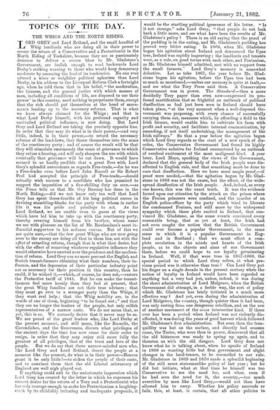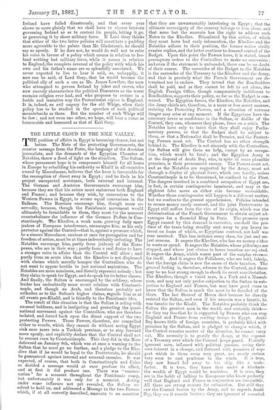TOPICS OF THE DAY.
THE WHIGS AND THE NORTH RIDING.
TIORD GREY and Lord Zetland, and the small handful of Whig landlords who are doing all in their power to secure the return of a Conservative and a Protectionist in the North Riding of Yorkshire, because they are so passionately desirous to deliver a severe blow to Mr. Gladstone's Government, are foolish enough to read backwards Lord Derby's striking warning to those who would keep democracy moderate by assuming the lead of its tendencies. No one ever uttered a wiser or weightier political aphorism than Lord Derby; in his address to the Liverpool Reform Club a fortnight ago, when he told them that in his belief, " the moderation, the fairness, and the general justice with which masses of men, including all conditions of life, are disposed to use their power" in this country, need nothing to perpetuate them, except that the rich should put themselves at the head of move- ments leading up to the necessary reforms. That is what we have always claimed for the Whigs ; and that is what Lord Derby himself, with his profound sagacity and unrivalled political influence, is now doing. But Lord Grey and Lord Zetland are taking the precisely opposite line. In order that they may do what is in their power,—and very little, indeed, is in their power,—to retard the necessary reforms of the land-laws, they throw themselves into the arms of the reactionary party ; and of course the result will be that they will stimulate enormously the sense of grievance to which they refuse a hearing, and will only sharpen the axe with which eventually that grievance will be cut down. It would have seemed to us hardly credible that a great Peer with Lord Grey's splendid antecedents as regards Free-trade,—for he was a Free-trader even before Lord John Russell or Sir Robert Peel had accepted the principle of Free-trade,—should actually wish success to a candidate who has promised to support the imposition of a five-shilling duty on corn,—as the Times tells us that Mr. Guy Dawnay has done in the North Riding,—did we not know only too well that Lord Grey has spent three-fourths of his long political career in devising stumbling-blocks for the party with whom in earlier life it was his pride and privilege to act. As for Lord Zetland, we are unable even to guess at the views which have led him to take up with the reactionary party, thereby severing himself from his brother, whose name we see with pleasure on the list of Mr. Rowlandson's most in- fluential supporters in his arduous canvas. But of this we are quite sure,—that the few great Whigs who are now going over to the enemy are doing all that in them lies, not with the elect of retarding reform, though that is what they desire, but with the effect of removing whatever regulative influence they would otherwise have exerted over the prudence and the modera- tion of reform. Lord Grey can no more prevent the English and Scotch tenant-farmers obtaining what their numbers, their in- fluence, and the depression of their particular industry point out as necessary for their position in this country, than he could, if he wished it,—which, of course, he does not,—restore the Protective tariff of 1841. But he can make the tenant- farmers feel more keenly than they feel at present, that the great Whig families are not their true advisers ; that they must go over to a stronger party than the Whigs, if they want real help ; that the Whig nobility are, in the words of one of them, beginning "to be found out ;" and that they are no longer the leaders of the people, but only selfish representatives of a narrow caste. We do not mean that, as yet, this is so. We earnestly desire that it never may be so. We are proud of the great leaders who, like Lord Derby at the present moment, and still more, like the Russells, the Cavendishes, and the Grosvenors, discern what privileges of the ancient days the time has now come for their order to resign, in order that they may enjoy still more fully the greatest of all privileges, that of the trust and love of the people. But we do say that these narrow-minded men who, like Lord Grey and Lord Zetland, desert the people at a moment like the present, do what is in their power—Heaven grant it be only little !—to sicken the people of their caste, and to convince them that the old Liberal aristocracy of England are well nigh played out.
If anything could add to the unfortunate impression which Lord Grey has created by the letter in which he expresses his earnest desire for the return of a Tory and a Protectionist who has only courage enough to make his Protectionism a laughing- stock by its childishly irritating and inadequate proposals, it
would be the startling political ignorance of his letter. " Is it not strange," asks Lord Grey, " that people do not look back a little more, and see what have been the results of Mr. Gladstone's policy ? There is an old saying that the proof of the pudding is in the eating, and Mr. Gladstone's pudding has proved very bitter eating. In 1868, when Mr. Gladstone began his agitation about Ireland and denounced the Upas tree, Ireland was rapidly improving ; the landlords and tenants were, as a rule, on good terms with each other, and Fenianism, as Mr. Gladstone himself admitted, met with no support from the small farmers." Lord Grey's memory is somewhat defective. Let us take 1867, the year before Mr. Glad.- stone began his agitation, before the Upas tree had been so much as mentioned,—unless our memory is quite at fault,— and see what the Tory Press said then. A Conservative Government was in power. The Standard—then a more decidedly Tory paper than even now—expressed its pro- found mortification that so frightful an outbreak of political disUffeetion as had just been seen in Ireland should have taken place, "at the very moment when a well-disposed Go- vernment was proposing, with every chance of successfully carrying them out, measures which, by affording a field to the Irish farmer, would enable him to cultivate his farm with profit and security, and facilitate internal communication, by amending, if not itself undertaking, the management of the Irish railways." So that a year before the agitation began which Lord Grey regards as the start of a new epoch of dis- order, the Conservative Government had found its highly Conservative sedative for Ireland encountered by an outbreak of cerebral excitement of the most malignant kind. A year later, Lord Mayo, speaking the views of the Government, declared that the general body of the Irish people were dis- affected to English rule, and that something must be done to cure that disaffection. Here we have most ample proof,—if proof were needed,—that the agitation begun by Mr. Glad- stone in 1868 was not the cause, but the effect, of the wide- spread disaffection of the Irish people. And, indeed, as every one knows, this was the exact truth. It was the evidence forced upon our attention by the attack on the prison where the Fenian prisoners were confined, and the murder of an English police-officer by the party which tried to liberate the condemned Fenians, and still more by the widespread sympathy which these plots excited in Ireland, that con- vinced Mr. Gladstone, as the same events convinced every reasonable being, that as yet at least, the Irish had not even caught the notion that the British Government could ever become a popular Government, in the same sense in which it is a popular Government in Eng- land and in Scotland ; that we must effect a com- plete revolution in the minds and hearts of the Irish people, as to the objects and aims of our Government there, before we could hope to see loyalty germinating in Ireland. Well, if that were true in 1867-1868, the special period to which Lord Grey refers, at what pre- vious period was it otherwise than trues Can Lord Grey put his finger on a single decade in the present century when the notion of loyalty in Ireland would have been regarded as anything but a very bad jest, unless, indeed, it was during the short administration of Lord Mulgrave, when the British Government did attempt, in a feeble way, the sort of policy which Mr. Gladstone has lately initiated in a much more effective way V And yet, even during the administration of Lord Mulgrave, the country, though quieter than it had been, was only resting from one dangerous rebellion, and on the eve of another movement of the same internecine kind. If there ever has been a period when Ireland was not violently dis- affected, it was during the years of good harvest which followed Mr. Gladstone's first administration. But even then the tran- quillity was but on the surface, and directly bad seasons came, the Tories, who were then in power, discovered that all the old bitterness was ready to spring up again, and to threaten us with the old dangers. Lord Grey does not know what he is talking about, when be speaks of Ireland in 1868 as wanting little but firm government and slight changes in the land-tenure, to be reconciled to our rule. Mr. Gladstone in 1869 and 1870 made a splendid beginning of the still more statesmanlike policy of last year ; but he did but initiate, what at that time he himself was to Conservative to see the need for, and what, even if he had seen the need for it, the country,—too much overriden by men like Lord Grey,—would not then have allowed him to carry. Whether his policy succeeds or fails, this, at least, is certain, that all other policies in Ireland have failed disastrously, and that every year shows us more plainly that we shall have to choose between governing Ireland so as to content its people, letting it go, or governing it by sheer military force. If Lord Grey thinks that either of the two latter policies will constitute a pudding more agreeable to the palate than Mr. Gladstone's, he should say so openly. If he does not, he would do well not to raise his voice in favour of a policy which means in relation to Ire- land nothing but military force, while it means in relation to England, the complete reversal of the policy with which his own and his father's name are so splendidly associated. We never expected to live to hear it said, as, unhappily, it now can be said, of Lord Grey, that he would become the political ally of such a one as Mr. James Lowther, the man who attempted to govern Ireland by jokes and sneers, who now suavely characterises the political Dissenters as the worst enemies religion ever had, and who proposes to restore in a feeble and tentative way the Protectionist regime in England. It is, indeed, an evil augury for the old Whigs, when their policy has to be studied in the speeches of such political mountebanks as these. But the number of such Whigs will be few ; and not even one other, we hope, will bear a name as honourable and honoured as that of Earl Grey.



































 Previous page
Previous page